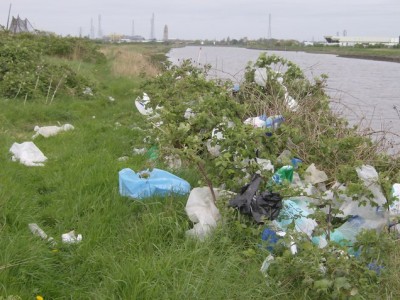General
Can the Supreme Court Provide Just Desserts?
Time for Different Flavors of Legal Reasoning
Ben and Jerry’s flavor honoring Stephen Colbert — “Americone Dream” — has been so successful, people are coming with other ideas. Tania Lambrozio gets lawyers into the act with her nomination: “Ruth Bader Ginger.” I’ve never actually had ginger ice cream, although I love ginger bread, so maybe it could work. Now there is a petition …
Continue reading “Can the Supreme Court Provide Just Desserts?”
CONTINUE READINGStick a Lemon In It
Are recent East Bay water troubles a taste of what lies ahead?
What makes a city world-renowned? For New York (according to the NYC Department of Environmental Protection), it’s the quality of its drinking water. Should this be so surprising? After all, what more fundamental connection does a city have to its residents and visitors than the life-sustaining water that it provides? Recent events in San Francisco’s …
Continue reading “Stick a Lemon In It”
CONTINUE READINGShut Up, Texas
Environmental Factors Smack Down Another Right-Wing Meme
If like me you are tired of Texans gloating about their supposed “miracle,” today’s post from Kevin Drum brings some good news: For years, business lobbyists complained about what they derided as “job killer” laws that drive employers out of California. Rival state governors, notably former Texas Gov. Rick Perry, made highly publicized visits to …
Continue reading “Shut Up, Texas”
CONTINUE READINGThe Unreasonable Risk of TSCA Reform
Caught Between a Rock and a Hard Place
The Frank R. Lautenberg Chemical Safety for the 21st Century Act is no doubt generating significant conflict, including claims of undue industry influence, competing bills from prominent members of the same party, consternation among states, and divisions among health and environmental groups. And it may also be the closest we have gotten to TSCA reform—ever. …
Continue reading “The Unreasonable Risk of TSCA Reform”
CONTINUE READINGCalifornia Supreme Court to Decide Major CEQA, Climate Change Case
Justices’ Latest Grant of Review Continues Supreme Court’s Focus on Environmental Law
To paraphrase former President Ronald Reagan, there they go again. The California Supreme Court on Wednesday granted review in an important case at the intersection of the California Environmental Quality Act (CEQA) and one of the state’s most important climate change laws. The case, Cleveland National Forest Foundation v. San Diego Association of Governments, is the …
Continue reading “California Supreme Court to Decide Major CEQA, Climate Change Case”
CONTINUE READINGTSCA Reform: That’s A Good Thing, Right?
Reform of the federal chemicals statute, the Toxic Substances Control Act (TSCA), is in the news again. It got me wondering, are we are better off with the devil we know? In a legislative era characterized by harsh partisanship and excruciating deadlocks, there are signs that TSCA reform could be a rare example of cooperation …
Continue reading “TSCA Reform: That’s A Good Thing, Right?”
CONTINUE READINGEcon101, Ideological Blinders, and the New Head of CBO
There are troubling indications that Keith Hall lets ideology blind him to basic economics.
Last week, in a post about the employment effect of regulations, I mentioned briefly that the new Director of the Congressional Budget Office, Keith Hall, had endorsed some questionable views on the subject. A reader pointed me toward an additional writing that has done a lot to escalate my concerns. There are disturbing signs about both Hall’s ideological bias …
Continue reading “Econ101, Ideological Blinders, and the New Head of CBO”
CONTINUE READINGOn China’s Remarkable Viral Air Pollution Video
Can 200 million viewers (and counting) be wrong?
Last Saturday evening, my research assistant (a wonderful JD student raised and educated in China) sent me a message: “This is a link to a documentary directed by Chai Jing (柴静). It has raised public concern about air pollution.” In perhaps the understatement of the year, she added: “Many Chinese people have been watching it.” …
Continue reading “On China’s Remarkable Viral Air Pollution Video”
CONTINUE READINGReferendum Politics: California’s Pioneering Plastic Bag Ban on Hold
Out-of-State Bag Manufacturers Succeed in Qualifying Referendum Measure for 2016 Ballot
California’s recently-legislated ban on disposable plastic bans–the first in the nation–will not take effect on July 1, 2015 as the new law mandates. That’s because industry opponents of the legislation have qualified for the November 2016 election a referendum measure that seeks to repeal the new law. Last fall I wrote on this site about …
Continue reading “Referendum Politics: California’s Pioneering Plastic Bag Ban on Hold”
CONTINUE READING‘The Centers Cannot Hold’ . . . At Least, Not in North Carolina
Attack on academic freedom? Or misunderstood management effort?
Both the NY Times and the Washington Post have reported on a recommendation that the North Carolina Board of Governors close several university centers. [Update: the recommendations were adopted by the Board a week later.] There are strong allegations that this is part of a conservative attack on the university system. There are certainly grounds to suspect …
Continue reading “‘The Centers Cannot Hold’ . . . At Least, Not in North Carolina”
CONTINUE READING










